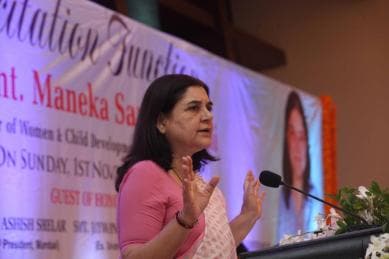Stay updated with the latest - Click here to follow us on Instagram
High-level panel slams legislature for failing to criminalise marital rape
In the report ‘Status of Women in India’, yet to be made public by the government, the panel has picked holes in the Criminal Laws (Amendment) Act 2013.

The central government-appointed Pam Rajput committee has criticised the legislature for its failure to criminalise or even recognise marital rape.
In the report ‘Status of Women in India’, yet to be made public by the government, the panel has picked holes in the Criminal Laws (Amendment) Act 2013. “The Act is silent on the issue of marital rape, making it an offence only in cases where the wife is under 15 years of age. The Verma committee had, however, recommended that marital rape should be made an offence irrespective of the age of the wife. This shows the legislature’s failure to appreciate the growing menace of this crime wherein the victim has to suffer on a daily basis,” said the report.
[related-post]
The report pointed out that the 2013 Act left out several crucial recommendations made by the Justice Verma committee, which was formed in the wake of the Delhi gangrape incident. The Criminal Laws (Amendment) Act 2013 was passed following the findings of the Justice Verma panel.
Committee chairperson Pam Rajput, founder director of the Centre for Women’s Studies at Panjab University, told The Indian Express, “Marriage is sacrosanct but that does not give anyone the right to abuse the body and dignity of women. It is in this context that we asked that marital rape be criminalised.”
The definition of rape under the Indian Penal Code exempts marital rape as it holds that “sexual intercourse by a man with his own wife, the wife not being under 15 years of age, is not rape”.
The high-level Pam Rajput committee traces the history of this exemption to the old English law, which assumes that by virtue of being married, a woman relinquishes all rights over her sexuality. It goes on to state that the English law today holds consent to be specific to each occasion of intercourse and that India too should recognise the act of rape, regardless of the nature of the relationship between the victim and the perpetrator.
The panel acknowledged that the 2013 Act has taken giant strides by widening the definition of rape, by defining consent, including non-penile penetration and even criminalising the act of forcing a separated wife into sexual acts. “In spite of this progress, marital rape whilst husband and wife are residing together is not punishable by law,” the report added.
It noted that the United Nations Committee on Elimination of Discrimination against Women (CEDAW) had observed that India should amend its laws to “reflect the realities of sexual abuse experienced by women and to remove the exception of marital rape…”
Since rape within marriage is not a criminal offence, victims can now take recourse only to civil remedies provided under the Protection of Woman from Domestic Violence Act, 2005.
Recently, the women and child development ministry faced flak for its Rajya Sabha reply, which held that marital rape as understood in the international context was not applicable in India. While the ministry later retracted its statement, the amended reply, too, maintained an ambiguous stand towards criminalising marital rape by citing a Parliamentary Standing Committee on Home Affairs 2013 report that talks about how criminalising marital rape will mean that “the entire family system will be under great stress”.
On the sidelines of a ministry event on Tuesday, Women and Child Development Minister Maneka Gandhi said that the government would look at criminalising marital rape.
WATCH INDIAN EXPRESS VIDEOS HERE